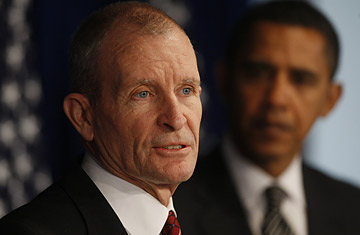
President-elect Barack Obama listens as National Intelligence Director-designate, Ret. Navy Adm. Dennis Blair, speaks during a news conference in Washington.
As Director of National Intelligence, Retired Admiral Dennis Blair will oversee the nation's sprawling complex of 16 intelligence agencies, a post he comes to having already served as a top CIA official near the end of a 34-year Navy career. He capped off that career as head of the U.S. Pacific Command, which makes him more Asia-centric than most past national-security appointees. He's good at running large bureaucracies; the Pacific Command covers more of the globe than any other.
Fast facts:
— Born February 4, 1947, in Kittery, Maine, he's a 1968 graduate of the U.S. Naval Academy along with fellow admiral Mike Mullen, chairman of the Joint Chiefs of Staff and Virginia Democratic Senator Jim Webb.
— He blazed a rapid ascent as a Rhodes Scholar (spending time at Oxford with Bill Clinton) as well as serving as a White House fellow.
— He served as the Central Intelligence Agency's first associate director of military support, and also worked on the National Security Council.
— He commanded a destroyer, then the Kitty Hawk Battle Group, and also ran the Pentagon's Joint Staff.
— Defense Secretary Donald Rumsfeld, chary of Blair's independence, passed him over as a possible chairman of the Joint Chiefs.
— After retiring from the Navy in 2002, he served as head of the Institute for Defense Analyses, a Pentagon-funded think tank.
— While leading IDA, the think tank assessed the wisdom of a multiyear contract for F-22 fighter jets while Blair was serving on the board of one of the F-22 project's subcontractors. The issue led him to give up his IDA post and the Pentagon inspector general to conclude he had violated conflict-of-interest rules.
— Married, with two grown children, a son and a daughter.
Quotes from:
"I don't think we can look at the families of the 3,000 people who died
in the eye and say that we should not have attacked earlier and thereby
disrupted that thing from happening — I think we should have."
— On whether or not the U.S. should have launched more — and more violent
— pre-9/11 attacks against al Qaeda in Afghanistan (February 2002 interview
with Time).
"As far as paramilitary operations go, I believe that we should have
components within the Department of Defense and within the CIA, and that
they should be working very closely together to apply the right kind of
capability to the right kind of task, because some of them are better at it
than others, and in certain circumstances you want somebody there who is not
tied to the armed forces of the United States."
— On whether or not the U.S. should have paramilitary forces cable of
disrupting terrorists before they strike (September 21, 2004, before the
Senate Appropriations Committee).
"If you look at North Korea and our interaction with them over the last
20 years, they've had an amazing strategy and no power; we've had an amazing
amount of power, very little strategy, and the result over 20 years has been
about a tie."
— On how a weak foe can frustrate a superpower (before a House
Armed Services subcommittee, July 31, 2008).
"I was a four-star out in one of the regional combatant commands when
Secretary Rumsfeld and his crowd came in. When he wanted to take his first
look at key questions, he'd call on a bunch of old, retired officers who he
happened to know in his former life to study things that were the clear
responsibility of the uniformed services, and it was just a disaster."
— On how not to hand off military command from one Administration to the
next (September 19, 2008 interview with Time).
Quotes from:
"To bring an admiral who last served in the Pacific out of retirement seems to me to be ignoring a great deal of expertise that's available in the still-serving military. So I would think that, with all respect for Admiral Blair, there was a lot of people who would have been a better choice."
— Michael Scheuer, ex-CIA bin Laden chief, January 6, 2009, the Newshour with Jim Lehrer, PBS
"The basic obligations of public service are undermined when an official has a financial interest in the projects his organization is overseeing. Blair's struggle to recognize that what he did was wrong makes him a troubling selection."
— Danielle Brian. head of the Project on Government Oversight, on the Pentagon IG finding Blair violated conflict of interest rules during his IDA stint, January 8, 2009
"As someone who has handled intelligence as a sailor at sea and a strategic thinker in Washington, he was have the expertise and authority to ensure that our 16 intelligence agencies act with unity of effort and of purpose."
— Barack Obama, naming Blair the Director of National Intelligence, January 9, 2009
